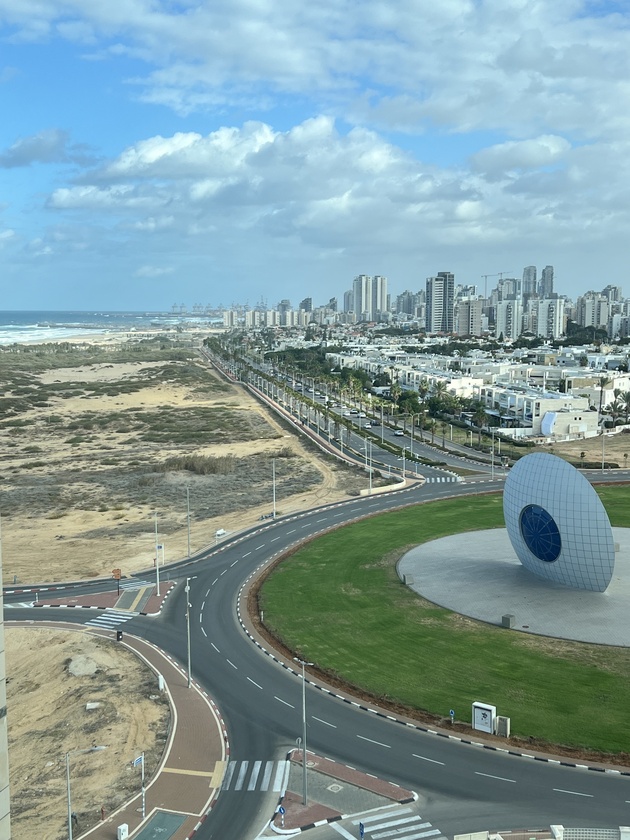I began the morning in Ashdod, and went for a run at sunrise in the sand dunes that line the beach. The weather was windy, and the surf was wild. In the sand dunes, the scene was more placid, and I even found gazelle tracks, though I did not see one of those majestic animals.
From there, I drove south to Zikim Beach, site of one of the most brutal Hamas assaults on October 7th. Terrorist commandos succeeded in landing on the beach and murdered innocent people -- surfers, fishermen, people out for a morning walk -- before attacking IDF bases.
Today, Zikim is a staging point for the Israeli military in its battles against Hamas in Gaza. It is also an entry point for humanitarian aid trucks entering the territory. A reserve IDF unit called Yatar took me on a fast ATV ride on a tour of the border, for a view of the battlefield.
From there, I drove north to Tel Aviv, for a meeting with Israeli government spokesman David Mencer, whom I usually encounter in Zoom press briefings. Then I drove east to Jerusalem, where I had a short lunch with incoming Israeli ambassador to the U.S., Dr. Yehiel Leiter.
Then I rejoined my friend from Magdala, Father Eamon Kelly, for a sneak preview of a mural of the Pentecost at the Notre Dame center, and for a rooftop view of the Christian Quarter of the Old City. The weather was cold and windy, and I decided to find my Airbnb before dark.
After a phone interview with an IDF official, I did a little shopping on Ben Yehuda Street, had dinner at a café in Mamilla, and walked to the Kotel, the Western Wall, for a last visit before I return to the U.S. on Wednesday evening. In the rain, the streets shone, reflecting every light.
This week’s portion launches the great story of Abraham, who is told to leave everything of his life behind — except his immediate family — and to leave for “the Land that I shall show you.”
There’s something interesting in the fact that Abraham is told to leave his father’s house, as if breaking away from his father’s life — but his father, in fact, began the journey, moving from Ur to Haran (in last week’s portion). His father set a positive example — why should Abraham leave him?
Some obvious answers suggest themselves — adulthood, needing to make one’s own choices, his father not going far enough, etc.
But I think there is another answer. Abraham (known for the moment as Abram) needs to establish his own household. This is not just about making one’s own choice, but really about choosing one’s own starting point. It’s starting over.
Sometimes we start over in fundamental ways even if much that surrounds us remains the same. Sometimes the journey we have to ...
The story of Noah is familiar; the details, less so.
Noah is often seen as an ambivalent figure. He was righteous -- but only for his generation. What was his deficiency?
One answer suggests itself: knowing that the world was about to be flooded, he built an Ark for the animals and for his own family -- but did not try to save anyone else or to convince them to repent and change their ways (the prophet Jonah, later, would share that reluctance).
Abraham, later, would set himself apart by arguing with God -- with the Lord Himself! -- against the destruction of Sodom and Gomorrah, saying that they should be saved if there were enough righteous people to be found (there were not).
Still, Noah was good enough -- and sometimes, that really is sufficient to save the world. We don't need heroes every time -- just ordinary decency.
Hi all -- as I noted last month, I'm going to be closing down my Locals page, at least for tips and subscriptions -- I may keep the page up and the posts as well, but I'm no longer going to be accepting any kind of payment.
Look for cancelation in the very near future. Thank you for your support!

















